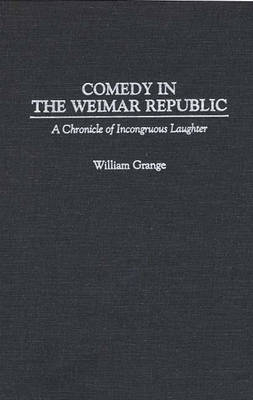
Comedy in the Weimar Republic
A Chronicle of Incongruous Laughter
Seiten
1996
Praeger Publishers Inc (Verlag)
978-0-313-29983-4 (ISBN)
Praeger Publishers Inc (Verlag)
978-0-313-29983-4 (ISBN)
Audiences attended performances of comedies in numbers far surpassing those of any other form of theatre.
Theatre was one of many German institutions experiencing profound change in the aftermath of World War I. Industrial comedy describes the most important and most predominant form of comedy on German stages from 1919 to 1933.
Theatre was one of many German institutions experiencing profound change in the aftermath of World War I. Grange contends that had comedy not prevailed throughout the turbulent years of the ill-fated Weimar experiment in democracy, much of theatre would have died along with the republic itself. Audiences attended performances of comedies in numbers far surpassing those of any other form of theatre.
Theatre was one of many German institutions experiencing profound change in the aftermath of World War I. Grange contends that had comedy not prevailed throughout the turbulent years of the ill-fated Weimar experiment in democracy, much of theatre would have died along with the republic itself. Audiences attended performances of comedies in numbers far surpassing those of any other form of theatre. Industrial comedy describes the most important and most predominant form of comedy on German stages from 1919 to 1933. Discoveries, reversals, mistaken identities, and abrupt plot twists were its stock-in-trade. Scholars and students of theatre as well as modern German history will find this a fascinating look at why Germans were laughing, and what they were laughing at, as their society crumbled around them.
Theatre was one of many German institutions experiencing profound change in the aftermath of World War I. Industrial comedy describes the most important and most predominant form of comedy on German stages from 1919 to 1933.
Theatre was one of many German institutions experiencing profound change in the aftermath of World War I. Grange contends that had comedy not prevailed throughout the turbulent years of the ill-fated Weimar experiment in democracy, much of theatre would have died along with the republic itself. Audiences attended performances of comedies in numbers far surpassing those of any other form of theatre.
Theatre was one of many German institutions experiencing profound change in the aftermath of World War I. Grange contends that had comedy not prevailed throughout the turbulent years of the ill-fated Weimar experiment in democracy, much of theatre would have died along with the republic itself. Audiences attended performances of comedies in numbers far surpassing those of any other form of theatre. Industrial comedy describes the most important and most predominant form of comedy on German stages from 1919 to 1933. Discoveries, reversals, mistaken identities, and abrupt plot twists were its stock-in-trade. Scholars and students of theatre as well as modern German history will find this a fascinating look at why Germans were laughing, and what they were laughing at, as their society crumbled around them.
WILLIAM GRANGE is Associate Professor in the Department of Performing Arts, Marquette University. An actor and director as well as a widely published scholar, he is the author of Partnership in the German Theatre (1991).
Preface
Introduction: Comedy for an Industrial Age
Comedy and the German-Language Theatre Audience
The 1918-1919 Season
The 1919-1920 Season
The 1920-1921 Season
The 1921-1922 Season
The 1922-1923 Season
The 1923-1924 Season
The 1924-1925 Season
The 1925-1926 Season
The 1926-1927 Season
The 1927-1928 Season
The 1928-1929 Season
The 1929-1930 Season
The 1930-1931 Season
The 1931-1932 Season
The 1932-January 30, 1933 Season
Biographical Appendix
Bibliographical Essay
Index
| Erscheint lt. Verlag | 11.10.1996 |
|---|---|
| Reihe/Serie | Contributions in Drama and Theatre Studies |
| Sprache | englisch |
| Maße | 156 x 235 mm |
| Gewicht | 510 g |
| Themenwelt | Literatur ► Lyrik / Dramatik ► Dramatik / Theater |
| Kunst / Musik / Theater ► Theater / Ballett | |
| Geschichte ► Teilgebiete der Geschichte ► Kulturgeschichte | |
| Sozialwissenschaften | |
| ISBN-10 | 0-313-29983-8 / 0313299838 |
| ISBN-13 | 978-0-313-29983-4 / 9780313299834 |
| Zustand | Neuware |
| Informationen gemäß Produktsicherheitsverordnung (GPSR) | |
| Haben Sie eine Frage zum Produkt? |
Mehr entdecken
aus dem Bereich
aus dem Bereich
der stille Abschied vom bäuerlichen Leben in Deutschland
Buch | Hardcover (2023)
C.H.Beck (Verlag)
23,00 €
Die Revolution des Gemeinen Mannes
Buch | Softcover (2024)
C.H.Beck (Verlag)
12,00 €


